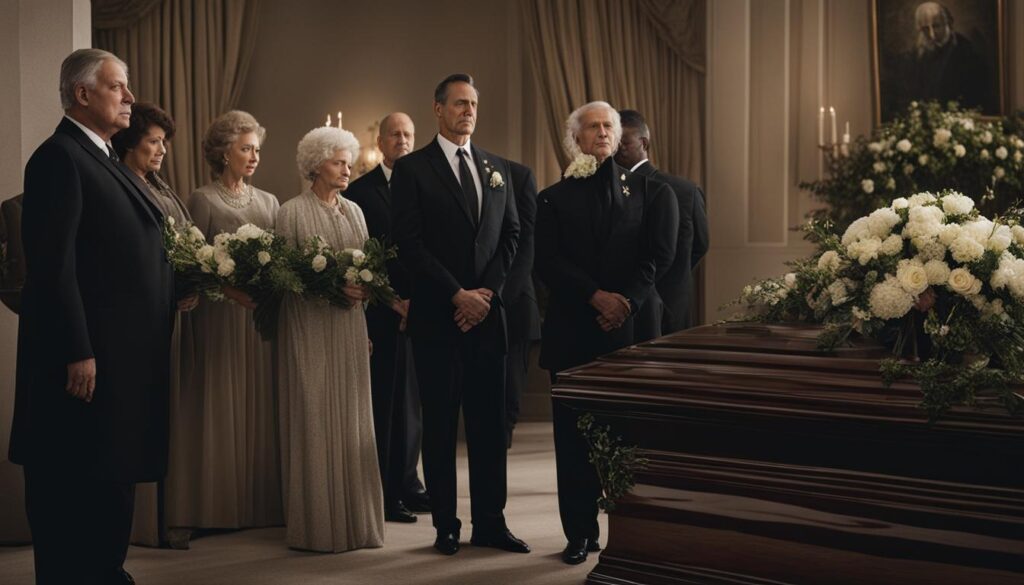We may earn money or products from the companies mentioned in this post.
Funerals are solemn events that require decorum and respect. Understanding proper funeral etiquette guidelines is essential to ensure that you can navigate these challenging times with grace and dignity. Whether you are a guest or a family member, adhering to these guidelines can show support for the grieving family and honor the memory of the deceased.
In this section, we’ll provide you with essential tips on proper funeral etiquette. We’ll discuss everything from appropriate attire to how to behave during the funeral ceremony. By the end of this article, you’ll have the knowledge and tools to navigate funeral proceedings respectfully.
Key Takeaways:
- Adhering to funeral etiquette guidelines is essential for respectful mourning.
- Understanding appropriate behavior and dress code are crucial for showing support for the grieving family.
- Proper funeral etiquette can help you honor the memory of the deceased.
- Both guests and family members should follow funeral etiquette guidelines.
- Showing respect and compassion for others during funeral proceedings is crucial.
Funeral Etiquette for Guests
Attending a funeral can be a challenging experience. It’s essential to follow proper etiquette to show respect for the deceased and their family. Here are some funeral dos and don’ts that guests should keep in mind:
Do dress appropriately
Wearing black or dark clothing is traditional for funerals. However, if the family has requested a specific dress code, follow their wishes. Avoid wearing anything too revealing or bright, as it may appear disrespectful.
Do arrive on time
Funerals generally have a scheduled start time, and it’s crucial to arrive on time. Being late can create an unnecessary disruption and cause additional stress for the family.
Do offer condolences
Offering your condolences to the family is a respectful gesture. Keep it simple, but heartfelt. Expressing sympathies such as “I’m sorry for your loss” or “My thoughts are with you” can bring comfort to those grieving.
Don’t bring children unless invited
Funerals may not be suitable for young children. If you must bring them, ensure they understand the solemnity of the occasion and can behave appropriately. Never leave children unattended, and consider stepping out with them if they become restless.
Don’t use electronic devices
Switch off all electronic devices or put them on silent mode. It’s disrespectful to have a phone ring or beep during the service. If you must use your phone for an emergency, step outside to do so.
Don’t take photos
While it may seem appropriate to take pictures to remember the occasion, funerals are private events and should be treated as such. Taking photos or videos is not acceptable without the family’s permission.
Don’t be disruptive
Ensure that your behavior is respectful and dignified throughout the proceedings. Avoid loud talking, laughing, or any other behavior that may cause a disturbance. If you need to leave early, do so discreetly, and avoid drawing attention to yourself.
Funeral Etiquette for Family Members
When it comes to funeral etiquette, family members have a vital role in ensuring a respectful and dignified mourning experience. As immediate relatives of the deceased, they bear both the weight of grief and the responsibility of arranging the funeral proceedings.
Funeral protocol dictates that immediate family members should take the front rows at the service, with siblings seated closest to the casket. Spouses and children of the deceased should sit beside or in front of the family. It is customary for family members to arrive early to greet guests.
It is also the responsibility of family members to lead the procession. The first car in the procession carries the immediate family, and the rest follow in a designated order. As the casket is transported from the service to the burial site, family members should walk behind it as a sign of respect.
Family members may also have specific roles during the ceremony. For example, a spouse or child may give the eulogy, while siblings or cousins may serve as pallbearers. It is important to communicate these roles beforehand to avoid confusion or misunderstandings.
Supporting Each Other
Grieving is a challenging process, and funeral etiquette extends beyond the ceremony itself. Family members should support each other throughout the mourning period, offering comfort and assistance where needed.
It is essential to respect each other’s feelings and coping mechanisms, allowing space for emotional expression without judgment. Family members should also communicate about practical matters, such as funeral expenses and arrangements, to avoid misunderstandings or conflicts.
Communicating with Guests
Family members may also need to communicate with guests during the funeral proceedings. It is customary to greet guests and express gratitude for their presence, although family members should not feel obligated to engage in lengthy conversations if they prefer not to.
It is also acceptable to set boundaries, such as requesting privacy during specific moments or asking guests to refrain from taking photos. Family members should communicate these requests clearly and respectfully.
Funeral Etiquette: Dress Code and Attire
When attending a funeral, it’s important to dress appropriately and respectfully. The way you dress shows your respect for the deceased and their loved ones. Here are some guidelines on what to wear:
- Colors: Stick to dark and neutral colors like black, navy blue, dark gray, and brown. Avoid bright, flashy, or loud colors, as they can be seen as disrespectful or distracting.
- Attire: Wear conservative and formal clothing, such as a suit or a dress. Avoid wearing casual clothes like shorts, t-shirts, and jeans.
- Jewelry: Keep jewelry simple and understated. Avoid wearing flashy or loud jewelry that draws attention to yourself.
- Shoes: Wear closed-toe shoes that are comfortable for standing and walking. Avoid wearing sandals, flip-flops, and sneakers.
- Hats: Women should wear modest and simple hats, while men should remove their hats inside the funeral home or church.
It’s important to remember that the dress code may vary depending on the cultural or religious customs of the deceased and their family. If you’re unsure about what to wear, it’s always best to ask the family or the funeral director for guidance.
“Your attire should be solemn and appropriate, not a reflection of your personal style.”
– Emily Post Institute
Following the dress code and attire guidelines shows your respect for the deceased and their family during this difficult time. By dressing appropriately, you can show your support and honor the memory of the deceased.
Funeral Ceremony Etiquette
Funeral ceremonies are somber occasions that require the utmost respect and decorum. Proper behavior at funerals not only shows respect for the deceased but also provides comfort and solace to the bereaved.
Conducting Oneself During the Service
It’s essential to arrive at least 15 minutes early to the funeral service, ensuring you have ample time to pay respects to the family and find a seat. Once the service has begun, maintain a solemn demeanor and refrain from talking or fidgeting. If you need to speak to someone, do so quietly and discreetly outside the service area.
During the service, it’s important to follow the instructions of the funeral director and clergy. If the ceremony involves a religious service, follow the customs of that faith, such as standing, sitting, or kneeling. If you’re unsure of what to do, observe the actions of those around you.
What to Say to the Bereaved
If you encounter a member of the bereaved family, offer your condolences and express your sympathy for their loss. Keep your statements brief and heartfelt, such as “I’m so sorry for your loss” or “Please accept my sincere condolences.” Avoid clichés or platitudes that may come off as insincere or insensitive, such as “They’re in a better place” or “Time heals all wounds.”
If you didn’t know the deceased well or at all, it’s perfectly acceptable to express sympathy for the family’s loss without mentioning the deceased’s name. For example, “I’m so sorry for your loss. Please know that you and your family are in my thoughts and prayers.”
Proper Actions When Paying Respects to the Deceased
When paying respects to the deceased, it’s important to follow the customs established by the funeral director and family. If the body is on display, approach the casket quietly and reverently, paying your respects with a brief moment of silence or prayer. You may offer flowers or other small mementos at this time, but only if the family has indicated it is appropriate.
If there is a guestbook, sign it with your name and a brief message of sympathy. Avoid writing anything lengthy or inappropriate, such as jokes or anecdotes.
Remember that a funeral is not a social event, and it’s important to keep the focus on the deceased and their family.
Conclusion
Funerals and memorial services are significant events that require a certain level of decorum and respect. Following proper funeral etiquette guidelines is crucial for showing support for the bereaved family and honoring the memory of the deceased.
As we have discussed, there are several key areas of funeral etiquette to consider, including appropriate behavior and attire for guests, the roles and responsibilities of immediate family members, and proper conduct during the funeral service.
By adhering to these guidelines, you can ensure that you contribute to a meaningful and dignified experience for all those involved. Remember to offer your condolences to the bereaved family, provide support and comfort when needed, and conduct yourself with respect and decorum.
Thank you for taking the time to learn about funeral etiquette guidelines. Your understanding and adherence to these essential tips will help create a respectful and meaningful experience for all involved.
FAQ
What is funeral etiquette?
Funeral etiquette refers to the traditional customs and guidelines followed when attending or participating in a funeral or memorial service. It outlines the appropriate behavior, dress code, and actions to show respect for the deceased and their family.
Why is funeral etiquette important?
Funeral etiquette is important as it helps create an environment of respect and support for the grieving family. It allows attendees to navigate the emotional and solemn nature of funerals with sensitivity and understanding, ensuring a dignified and meaningful experience for all.
What should I wear to a funeral?
When attending a funeral, it is important to dress in a respectful and conservative manner. Opt for dark and subdued colors, such as black or navy, and avoid wearing casual or flashy attire. Men typically wear suits or dress pants with a shirt and tie, while women can opt for a dress, skirt, or pantsuit.
Are there any specific behaviors I should follow during a funeral ceremony?
Yes, during a funeral ceremony, it is important to maintain a quiet and respectful demeanor. Avoid excessive talking, laughing, or using electronic devices. Follow the guidance of the funeral director or officiant, and be attentive to the wishes and emotions of the grieving family.
How can I offer my condolences to the grieving family?
When offering condolences to the grieving family, it is appropriate to express your sympathy and offer support. Use phrases such as “I’m sorry for your loss” or “My condolences” and avoid sharing unsolicited advice or personal anecdotes. Simple gestures, such as sending flowers or a heartfelt note, can also be meaningful.
What should I do if I am a family member of the deceased?
As a family member of the deceased, it is important to take on certain responsibilities during the funeral proceedings. This may include participating in the planning process, delivering eulogies or speeches, and offering support to other family members. It is also important to allow yourself time to grieve and seek support from loved ones.
Can I bring my children to a funeral?
Whether or not to bring children to a funeral is a personal decision that depends on various factors, such as the child’s age and maturity, the relationship to the deceased, and the nature of the funeral. It is important to consider the potential impact on the child and ensure they understand the significance and solemnity of the event.
How long should I stay at a funeral?
The length of time to stay at a funeral can vary depending on the circumstances and your relationship with the deceased and their family. It is generally considered respectful to stay for at least a portion of the funeral service to pay your respects and offer support. However, if you need to leave early, it is important to do so discreetly and quietly.
Affiliate Disclosure: This post may contain affiliate links. If you purchase through our link, we may receive a small commission, but at no additional cost to you. For more information, please see our Disclosure statement.



